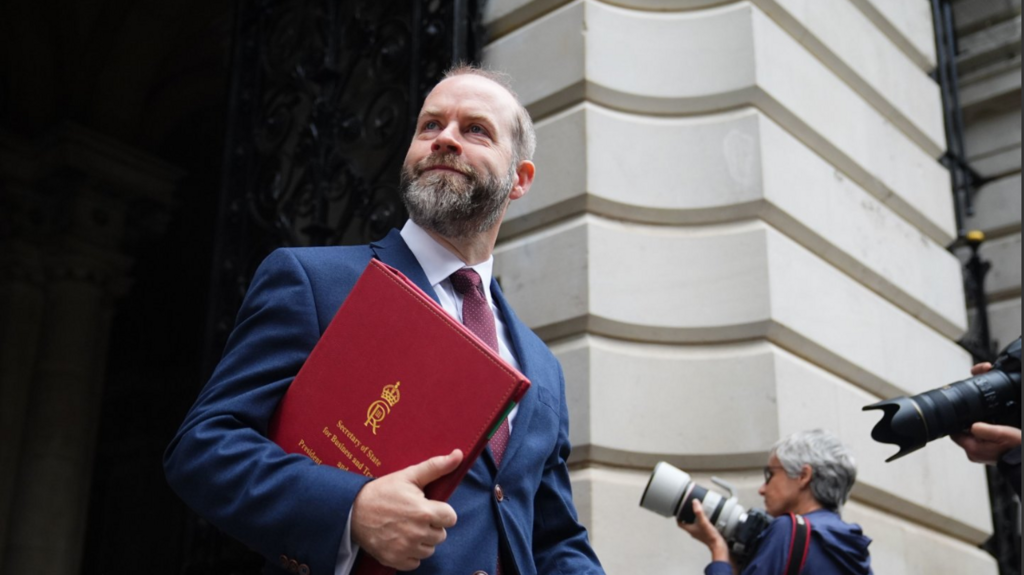“`html
Trade Secretary Jonathan Reynolds has dismissed warnings that recognizing a Palestinian state could violate international law as “missing the point.”
Earlier this week, Prime Minister Sir Keir Starmer announced the UK would move towards recognition contingent upon Israel meeting specific conditions, including a ceasefire agreement and the revitalization of a two-state solution.
However, a group of prominent British legal experts has cautioned that Palestine may not satisfy the legal criteria for statehood as defined by a 1933 treaty.
Nearly 150 of the UN’s 193 member states have already formally recognized a Palestinian state, with nations like Canada, Germany, and Portugal considering similar action.
The Montevideo Convention, signed in 1933, outlines the criteria for state recognition under international law, including a defined territory, a permanent population, an effective government, and the capacity to engage in relations with other states.
In a letter to the government’s attorney general, Lord Hermer, first reported by the Times, 43 cross-party peers are urging him to advise the prime minister against recognition.
The group includes leading legal figures such as former Supreme Court judge Lord Collins of Mapesbury and Lord Pannick KC, a patron of UK Lawyers for Israel.
“It is clear that there is no certainty over the borders of Palestine,” they argue, adding that “there is no functioning single government, Fatah and Hamas being enemies”.
“The former has failed to hold elections for decades, and the latter is a terrorist organisation, neither of which could enter into relations with other states,” the letter states.
While the UK did not sign the 1933 convention, the lawyers contend that it has “become part of customary law and it would be unwise to depart from it at a time when international law is seen as fragile or, indeed, at any time”.
They further state: “You have said that a selective, ‘pick and mix’ approach to international law will lead to its disintegration, and that the criteria set out in international law should not be manipulated for reasons of political expedience.
“Accordingly, we expect you to demonstrate this commitment by explaining to the public and to the government that recognition of Palestine would be contrary to the principles governing recognition of states in international law.”
Lord Hermer has previously affirmed that a commitment to international law “goes absolutely to the heart” of the government’s approach to foreign policy.
Jonathan Reynolds defended the plans on BBC Radio 4’s World At One programme, suggesting the peers needed to “look at the levers the UK has” to deliver peace.
Asked about the signatories’ concern recognition does not align with the 1933 Montevideo Convention, Reynolds said: “I think to be honest, with respect to those colleagues, that is missing the point somewhat.”
He explained the objective was “not just a ceasefire for the conflict in Gaza but a genuine peace process, and that requires a two-state solution”.
Asked about why conditions had not been placed on Hamas, he said: “Hamas is a terrorist organisation and we don’t put conditions on those, we don’t negotiate with terrorists.
“We’ve been absolutely clear: it’s our longstanding position that the hostages have to be released. It’s also our longstanding position that Hamas can play no role in the future governance of Gaza or any Palestinian state.
“So those are our absolute condition, but we will never be willing to negotiate with Hamas because they are a terrorist organisation.”
The peers’ intervention follows condemnation of Sir Keir’s announcement by Emily Damari, a British-Israeli women who was held captive by Hamas for more than a year, who said Sir Keir is “not standing on the right side of history”.
Israeli Prime Minister Benjamin Netanyahu also claimed it “rewards Hamas’s monstrous terrorism”.
Canadian Prime Minister Mark Carney said his country plans to recognise a Palestinian state as part of the two-state solution – that is Israel and Palestine living side-by-side.
Carney said his decision was prompted by the “catastrophe” in Gaza, and because he feared the prospect of a Palestinian state was “receding before our eyes”.
The Palestinian Authority – which runs parts of the occupied West Bank – must commit to “much-needed reform” he said, and Hamas, which controlled Gaza, “can play no part”.
The UK has said it too would recognise a Palestinian state at a UN summit in September unless Israel committed to a ceasefire.
Sir Keir has said the UK will only refrain from recognition if Israel allows more aid into Gaza, stops annexing land in the West Bank, agrees to a ceasefire, and signs up to a long-term peace process over the next two months.
He also said Hamas must immediately release all remaining Israeli hostages, sign up to a ceasefire, disarm and “accept that they will play no part in the government of Gaza”.
The question of international law has been repeatedly raised with the prime minister by more than 800 other lawyers, who allege Israel has flouted the Geneva Convention by committing war crimes including genocide in Gaza.
Sign up for our Politics Essential newsletter to keep up with the inner workings of Westminster and beyond.
Observers are baffled at how Hamas can pay officials as Gaza is isolated and largely reduced to rubble.
Four commercial trucks were looted in central Gaza along unsafe roads controlled by Israel, private contractor says.
The UN’s assistant secretary general says reports of the possible move are “deeply alarming”.
Ilay David says the Hamas video showing his brother Evyatar emaciated and weak is a “new form of cruelty” that has left his parents shattered.
It comes amid reports that PM Netanyahu is pushing to expand Israel’s military operations in Gaza.
“`

